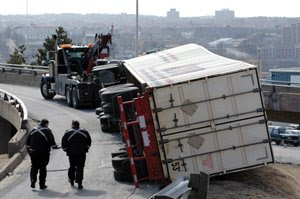 For years we have been describing the rapidly emerging and potentially devastating financial risks involved in hiring motor carriers who are involved in accidents causing property damage, bodily harm or worse. It started with the “Schramm” case where a federal court found that broker CH Robinson could be made to stand trial to examine the facts and determine whether the broker had exercised "reasonable care" and "due diligence" in selecting the carrier who caused severe bodily harm. Shortly after Schramm, came the Puckrein case, where a state's highest appellate court applied the same negligence principle to shippers who hire carriers.
For years we have been describing the rapidly emerging and potentially devastating financial risks involved in hiring motor carriers who are involved in accidents causing property damage, bodily harm or worse. It started with the “Schramm” case where a federal court found that broker CH Robinson could be made to stand trial to examine the facts and determine whether the broker had exercised "reasonable care" and "due diligence" in selecting the carrier who caused severe bodily harm. Shortly after Schramm, came the Puckrein case, where a state's highest appellate court applied the same negligence principle to shippers who hire carriers.
These new “laws” state that where a shipper or broker hires a motor carrier with a questionable safety record, and that carrier is involved in an accident involving property damage, injury or death, that shipper or broker may be found liable under the doctrines of “negligent entrustment” or “negligent hiring” or even “vicarious liability” to the tune of multiple millions of dollars.
Prior to Schramm, shippers and brokers were almost immune from such liability because these parties didn’t own the truck, weren’t driving it and were not involved in the incident at the scene. Since Schramm, courts are increasingly willing to make shippers and brokers stand trial for negligence, not for causing the damage, but for failing to carefully scrutinize the carrier who did. Millions of dollars are at stake.
Prominent transportation attorney and colleague Ron Usem of Huffman, Usem, Saboe, Crawford & Greenberg, P.A. in Golden Valley, MN brought to industry’s attention the Jones v. D’Sourza case in the TIA’s February edition of “The Logistics Journal.” “Jones” is yet another case that raises the bar even further than Schramm, and as a result, defendant, broker C.H. Robinson will need to defend itself in court by showing a documented paper trail that it consistently adhered to its due diligence procedures.
Three (3) things every shipper, broker and user of motor carriers must do: (a) have written safety procedures (b) follow them every time, and (c) maintain a paper trail to demonstrate your adherence to your procedures. If you are using a third party like a broker, ensure that they are also following such procedures. If an accident happens and you don’t have adequate procedures in place, you won’t have anywhere to hide.
Tucker Company’s consulting service is helping shippers to write and/or re-write carrier qualification and selection procedures. If you have any questions, please contact us today!
